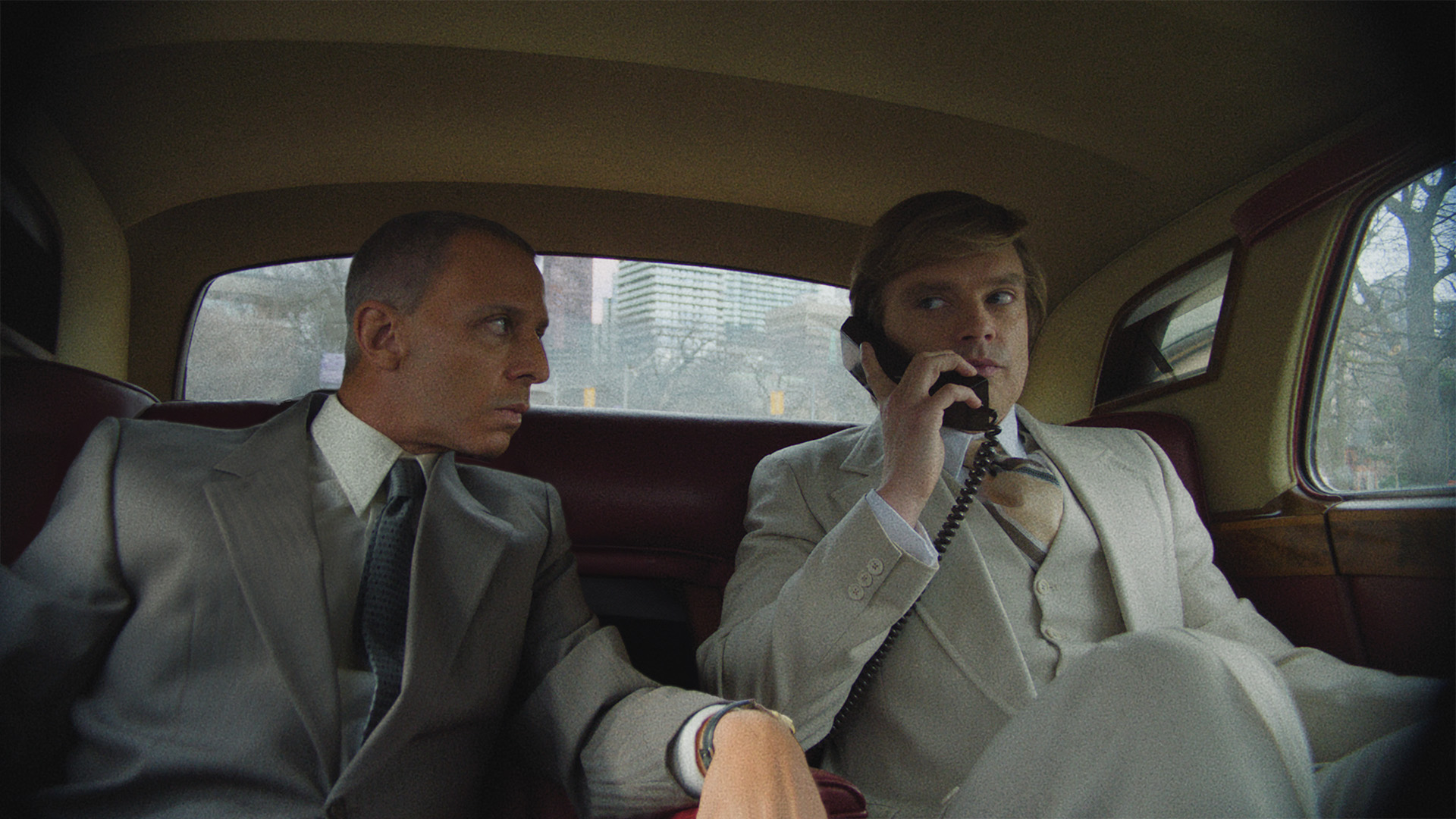The Apprentice (general release)
The man who designed much of what we now called Trumpism died 38 years ago. His name was Roy Cohn, a brutal, ferociously right-wing New York lawyer, who spotted the ruthless potential of the young property developer in 1973 and trained him in the dark arts. In The Apprentice, he is played by Jeremy Strong – an Oscar-worthy performance that in itself makes Ali Abbasi’s film a must-see. (Donald Trump has already denounced it as “A FAKE and CLASSLESS Movie” and tried to block its release.)
Credit is also due to Sebastian Stan who has the difficult task of playing Trump in his twenties and thirties: an often gauche but angrily ambitious young man who seeks status and power far beyond going door to door at his father’s squalid properties to demand envelopes of cash from indigent tenants.
Intelligently, Stan chooses not to present Trump as simply a germinal version of the 78-year-old who will seek re-election to the presidency on November 5. Yes, he is a cauldron of resentments, appetites, social insecurities and foul yearnings. But the film does not make the mistake of suggesting that he was ever a man of destiny. If anything, the movie shows how arbitrary and capricious history can be.
He was, of course, the beneficiary of the business built by Fred Trump (Martin Donovan) and of his chance meeting with Cohn in the exclusive nightspot, Le Club on East 55th Street. Notionally the family’s attorney, Cohn became the younger Trump’s mentor and consigliere, teaching him how to get what he wanted (“Attack, attack, attack”; “Admit nothing, deny everything”; “No matter what happens, claim victory and never admit defeat”). America, Cohn tells his protégé, is “a nation of men, not laws”.
Trump was also the product of a very particular place and time: the failing, crime-ridden New York of the 1970s (the world of Martin Scorsese’s Mean Streets and Taxi Driver) and then the rejuvenated city of bombast, greed and vulgar display that it became in the 1980s. Opened in 1983, Trump Tower was, and remains, a monument to that decade – an era in which the Republican nominee is in many respects still stranded.
There are plenty of well-observed moments in the movie, not least when Trump meets Andy Warhol at one of Cohn’s debauched house parties and asks him what he does for a living. He shoots the breeze in his office with the political fixer Roger Stone – who would later orchestrate the “Stop the Steal” campaign in 2020-21 – about his potential as a candidate for public office; a path which, at this point, he still dismisses as the choice of “losers”.
The sting of the story lies in Cohn’s dawning appreciation that he has created a monster who will one day turn on him – and does, when he is diagnosed with AIDS. As undoubtedly wicked as he was, Cohn had an allegiance, however twisted, to America – his most important client, as he put it. But Trump had, and has, no allegiance at all, other than to himself. To watch that terrible force of amorality revealing itself is a cinematic experience as chilling as it is compelling.
Sonny Boy: A Memoir (Century)
By coincidence, Al Pacino also played Roy Cohn in HBO’s 2003 adaptation of Tony Kushner’s Angels in America: an experience that he recalls with pleasure in this terrific memoir.
Now aged 84, Sonny Boy, as his mother Rose called him, was brought up in the Bronx where he roamed the streets with his little gang looking for adventure: “a pack of wild, pubescent wolves with sly smiles”.
Three of his best friends, Cliffy, Petey and Bruce went on to be killed by heroin addiction, and his mother died “like Tennessee Williams had died, choking on her own pills”. Pacino’s escape lay in a passion for language, literature and acting.
Though he is celebrated for his definitive screen performances as Michael Corleone, Sonny Wortzik, Tony Montana, and Lt Col Frank Slade, he is, more than any giant of the cinema since Orson Welles, first and foremost a stage actor.
“If the hour was late,” he writes, “and you heard the sound of someone in your alleyway with a bombastic voice shouting iambic pentameter into the night, that was probably me.” He read Flaubert and Baudelaire on the subway and declares that “Chekhov became a friend of mine”. Having seen him play Herod in Oscar Wilde’s Salomé in Los Angeles in 2006, I can attest to the sheer intensity and subtlety of his stage presence.
Sonny Boy is written with a pleasing eccentricity (“You haven’t lived till you’ve seen the Mona Lisa made out of Legos”), and an honesty that cannot have come easily to this famously shy man (“I’m ratting on myself”). He admits that he has never managed his finances well, and that his personal life has been a rollercoaster. But his undimmed passion for his art, surprise that he is still able to do what he loves and rich sense of humour ensure that this is a model of its genre.
Woman of the Hour (Netflix)
Anna Kendrick’s directorial debut – in which she also stars as Cheryl Bradshaw, a struggling actress in 1970s Los Angeles – is a true crime movie that, for once, dramatises a horrible case without resorting to melodrama or exploitation.
Daniel Zovatto is truly frightening as serial killer Rodney Alcala, who posed as a fashion photographer to introduce himself to young girls and women. Incredibly, he also appeared as a contestant on the real-life TV show, The Dating Game, in 1978: a sequence that is the heart of the movie’s narrative arc, as Cheryl, desperate for a job, agrees to be the woman choosing between three potential dates. As the phoney banter proceeds between commercial breaks, an audience member, Laura (Nicolette Robinson), recognizes Alcala as her friend’s murderer.
Nobody takes her seriously, which is the bitter message that runs through Woman of the Hour: there were plenty of warning signs that Alcala was a monster, but none was properly pursued by the authorities. As one of the make-up artists at the show says to Cheryl backstage, the real question women are always asking men is: “Which one of you will hurt me?”
The Fear of 13 (Donmar Warehouse, London, until November 30)
Based on David Sington’s acclaimed 2015 documentary of the same name, Lindsey Ferrentino’s (very different) dramatisation of the case of Nick Yarris – who spent 22 years on death row in Pennsylvania for a rape and murder he did not commit – is a remarkable achievement.
It helps that Yarris is played by an actor of Adrien Brody’s stature and audacity, and that the director is Justin Martin – also responsible for the award-winning West End staging of Suzie Miller’s Prima Facie with Jodie Comer in 2022. Brody and Martin are true to the source material, but not constrained by it, and what makes The Fear of 13 so riveting is the use of compressed space, music, lighting and (above all) the power of people’s stories.
In particular, Ferrentino’s script focuses upon the unexpected emotional connection that forms between Yarris and prison volunteer Jackie Shaffer (Nana Mensah, excellent). From their first encounter, he woos her with his knowledge of J.D. Salinger and reveals that he has become an omnivorous reader in prison, scouring the dictionary for words he does not know (the meaning of “triskaidekaphobia” gives the play its title). Even in captivity, he seeks a liberation of the mind.
As the two fall in love, the years pass as Yarris awaits DNA evidence that will save his life. To its credit, the play offers no pat moment of all-encompassing redemption – which is not to say that it denies the audience a sense of hope.The Fear of 13 is Timothy Sheader’s first production as the Donmar’s new artistic director and shows (if further proof were needed) how short-sighted it was of Arts Council England to withdraw the theatre’s funding in 2022. Shame on them.




